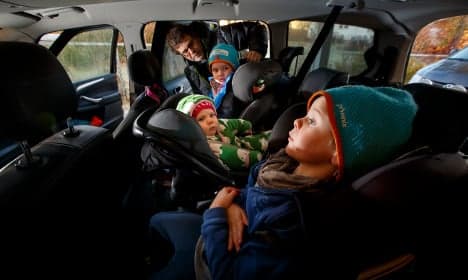First-born kids more likely to become CEOs: study

First-born children are around 20 percent more likely to be managers than their third-born siblings, a Swedish study has found.
The Institute for Evaluation of Labour Market and Education Policy (IFAU) based their study on population data from number-crunchers Statistics Sweden and enlistment records from Sweden's many decades of compulsory military service to investigate how siblings' role in the family affects career choices.
It concluded that first-borns have greater social maturity, focus and perseverance, intensity and emotional stability, which improves their chances of finding a job and climbing the career ladder.
"The main result is that siblings' place in the family affects their personality and future career. Older siblings have better social skills and are more likely to become managers," one of the report's authors, Uppsala University professor Björn Öckert, told The Local on Wednesday.
Younger siblings, however, are more likely to start up and run their own business.
"We don't know if younger siblings more often run businesses because they are more risk prone and creative, or because it's harder for them to find jobs. We find however that little sisters more often have creative jobs, which could indicate that they are more creative," said Öckert.
The study also found that first-born sons were 33 percent more likely to have top-level manager jobs than their third-born brother.
First-born daughters, meanwhile, were 60 percent more likely to be top-level managers. The report explained: "Because there are far fewer female top managers, the relative importance of sibling order is greater for women."
When taking all managerial positions into account, the results were similar for both sexes: a first-born had 18-22 percent higher chance at becoming a manager than third-born siblings.
"We don't know exactly what the reason is. However, it appears that the negative effects of birth order only depends on environmental factors that are determined after birth," said Öckert, who is a younger brother.
"We see that parents tend to spend less time and resources on younger siblings, which could be a possible explanation for the relationship. However, it doesn't rule out that sibling dynamics is also an important explanatory factor,"
Comparing the professions of around 1,400,000 siblings and, using Sweden's unique military enlistment data, the personalities of more than half a million brothers, the study claims to be the first of its kind to establish credible causal links between birth order and personality.
"Siblings have on average the same genetic preconditions. By studying how their place in a group of siblings affects the individual, it enables us to better understand how differences in childhood environment affect people's chances in life," added Öckert in a statement.
Comments
See Also
The Institute for Evaluation of Labour Market and Education Policy (IFAU) based their study on population data from number-crunchers Statistics Sweden and enlistment records from Sweden's many decades of compulsory military service to investigate how siblings' role in the family affects career choices.
It concluded that first-borns have greater social maturity, focus and perseverance, intensity and emotional stability, which improves their chances of finding a job and climbing the career ladder.
"The main result is that siblings' place in the family affects their personality and future career. Older siblings have better social skills and are more likely to become managers," one of the report's authors, Uppsala University professor Björn Öckert, told The Local on Wednesday.
Younger siblings, however, are more likely to start up and run their own business.
"We don't know if younger siblings more often run businesses because they are more risk prone and creative, or because it's harder for them to find jobs. We find however that little sisters more often have creative jobs, which could indicate that they are more creative," said Öckert.
The study also found that first-born sons were 33 percent more likely to have top-level manager jobs than their third-born brother.
First-born daughters, meanwhile, were 60 percent more likely to be top-level managers. The report explained: "Because there are far fewer female top managers, the relative importance of sibling order is greater for women."
When taking all managerial positions into account, the results were similar for both sexes: a first-born had 18-22 percent higher chance at becoming a manager than third-born siblings.
"We don't know exactly what the reason is. However, it appears that the negative effects of birth order only depends on environmental factors that are determined after birth," said Öckert, who is a younger brother.
"We see that parents tend to spend less time and resources on younger siblings, which could be a possible explanation for the relationship. However, it doesn't rule out that sibling dynamics is also an important explanatory factor,"
Comparing the professions of around 1,400,000 siblings and, using Sweden's unique military enlistment data, the personalities of more than half a million brothers, the study claims to be the first of its kind to establish credible causal links between birth order and personality.
"Siblings have on average the same genetic preconditions. By studying how their place in a group of siblings affects the individual, it enables us to better understand how differences in childhood environment affect people's chances in life," added Öckert in a statement.
Join the conversation in our comments section below. Share your own views and experience and if you have a question or suggestion for our journalists then email us at [email protected].
Please keep comments civil, constructive and on topic – and make sure to read our terms of use before getting involved.
Please log in here to leave a comment.